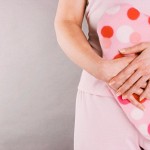Period Pain
Known medically as dysmenorrheal, period pain is caused by substances called prostaglandins. Many prostaglandins are healthy, but some are unhealthy and can increase your sensitivity to pain.
 Around ten percent of the women who suffer from period pain (and about half of us do) describe their pain as severe, starting anything from one hour to a day before a period begins and typically lasting for around 24 hours.
Around ten percent of the women who suffer from period pain (and about half of us do) describe their pain as severe, starting anything from one hour to a day before a period begins and typically lasting for around 24 hours.
In all types of period pain, from the milk to the severe, cells in your uterine lining release unhealthy (or “bad”) prostaglandins when the uterine lining begins to shed during your period. This release stimulates your uterus to contract. If you have high levels of “bad” prostaglandins, these natural muscular contractions will become painful.
A woman typically gets period pain only when she is ovulating normally, so the good news is that cramping is usually a sign that there’s nothing wrong with your cycle. In some instances, though, your period pain may be as a result of another condition, in which case it is known medically as secondary dysmenorrheal. The conditions that can cause cramping tend to be more serious than simple period pain itself and include fibroids and endometriosis. As a result, if you suffer from period pain, particularly if your period pain is severe and it is accompanied by heavy or prolonged bleeding, it’s important to visit your doctor to have these other conditions ruled out.
Conventional Treatments
Most conventional medical help for dealing with period pain is fairly limited because it treats the symptoms (the pain), but not the cause (the “bad” prostaglandins). If you don’t take your medication, your symptoms will return.
Painkillers The most likely treatment your doctor will offer you is a painkiller, such as ibuprofen. Be aware, however, that taking painkillers can cause stomach upset and nausea.
The contraceptive pill Because the Pill leaves you with no real period, you experience no pain. However, headaches and breast tenderness may occur.
Your Diet
What you eat can decrease or increase the levels of “bad” prostaglandins in your system. The hormone-balancing diet should become your staple diet. In particular, cut down on caffeine (in coffee, tea, and chocolate) and saturated fat (mainly in dairy and animal products) because they encourage the body to produce bad prostaglandins. Also, increase the amount of essential fats in your diet, from foods such as oily fish, as well as nuts and seeds. You body needs essential fats to produce good prostaglandins to counteract the bad.
Although it’s unclear why, heavy or spicy meals can sometimes contribute to period pain. In the week running up to your period, keep your diet light and spice-free to see if this helps relieve the cramping.
It is strongly recommended that you take good quality multi-vitamins and minerals every day. The dosages are total daily dosages, including anything in your multi. So, if the multi contains 100mg magnesium, you need to add in a separate supplement containing only 200mg magnesium per day – the same principle applies for all the other vitamins and minerals.
• B-Complex Your body needs vitamin B6 to produce good prostaglandins and studies show that vitamin B6, B1, and B12 significantly reduce the intensity of period pain.
• Vitamin C with bioflavonoids Vitamin C is an antioxidant that may ease period pain in the same way as vitamin E.
• Vitamin E This vitamin has antioxidant properties that can help control the levels of bad prostaglandins in your system, which is why studies show that women who take vitamin E have reduced painful periods. Take it as d-alpha tocopherol.
• Magnesium This mineral acts as a muscle relaxant. Take it as magnesium citrate.
• Zinc Your body uses zinc (as well as magnesium and vitamin B6) to convert omega-3 and omega-6 essential fatty acids into beneficial prostaglandins.
• Bromelain This enzyme (found naturally in pineapples) has anti-inflammatory properties, helping to ease pain. It also acts as a muscle relaxant.
• Omega-3 Fatty Acids Omega-3 oils (or essential fatty acids) are vital nutrients that provide the raw materials for the production of good prostaglandins, which is why you should both increase them in your diet and take a supplement.

